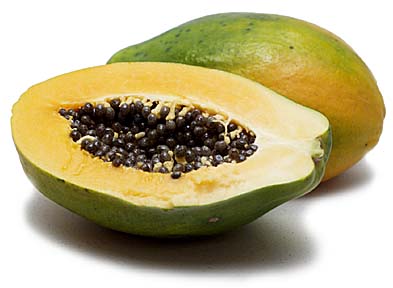

Key Ingredient

|
MAUNAWILI SWEET PAPAYA
Papayas abound in Hawaii year-round. The sheer variety available today is astounding. From the staple Solo to the salmon-pink strawberry papaya, flavor and texture also run the gamut.
Yet another variety has emerged to sweeten the pot. The "Maunawili Sweet" was actually discovered by its founder, Jerry Roberts, growing wild. Through experimentation in growing techniques, the papaya has proven to be a sweet winner.
The basics: The papaya, sometimes mistakenly referred to as papaw or pawpaw in other parts of the world, is a fruit indigenous to Central and South America. Hundreds of varieties are available, ranging from 1 to 20 pounds.
The Maunawili Sweet has been found to be closely related to the Kamiya papaya, through research by Dr. Maureen Fitch, a plant physiologist at the Pacific Agricultural Research Center.
It was discovered growing wild in the wet terrain of Maunawili and has been found to be very tolerant of wet growing conditions. The variety is also resistant to the papaya ringspot virus that has devastated crops throughout the state.
The fruit is characteristically large, averaging 2 to 3 pounds, with an oblong shape. It is mild-tasting and very sweet, meaty and firm.
Papayas are a good source of vitamins A and C.
Selecting: As with all papayas. Choose fruit that is two-toned in color with green and yellow shades. Ripe papayas should give a little when pressed. Avoid overripe papayas that are completely yellow or purely green papayas (unless looking for the variety used in Asian salads and stir-fries).
Storing: Most papayas need to be ripened for a day or two after purchase. Place them in a paper bag for quicker ripening. Store ripe papayas in the refrigerator for a couple of days.
Use: Maunawili Sweet should be enjoyed as is. Cut the papaya in half lengthwise and spoon out the seeds. Since the variety is large, a single fruit can be quartered for individual servings or used in a fruit or salad bowl.
Or, create an entrée by filling a papaya half with fruit, shrimp or chicken salad and serve on a bed of greens.
Where to buy: Maunawili Sweet papaya is sold at Fort Ruger Market and Huckleberry Farms in Nuuanu. Or, contact Jerry and Margaret Roberts of J.R. Roberts Farms at 595-4539. You'll pay a bit more for this papaya, about $1.39 a pound, but it's worth it.
Food Stuffs: Morsels
Eleanor Nakama-Mitsunaga is
a free-lance food writer. Contact her
online through features@starbulletin.com